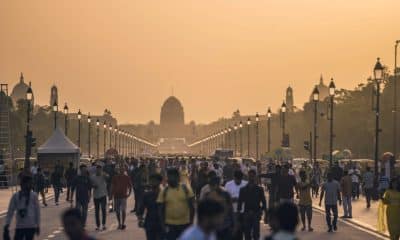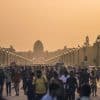Business
Looming threat of third COVID wave indicates muted traffic recovery this fiscal too: APAO
The looming threat of the third COVID-19 wave indicates a muted traffic recovery even in this fiscal, and the traffic will barely reach the last year’s level which itself was not adequate for the financial survival of airports, according to an industry body.
With the sector being severely hit by the pandemic, airports are not generating sufficient cash flows to sustain operations and meet debt obligation, as per the Association of Private Airport Operators (APAO).
The domestic passenger demand is falling drastically and international operations remain suspended since late-March 2020 while airport operators continue to incur high fixed costs, the association added.
It also said the airport operators’ aero revenues have drastically reduced by 75-80 per cent, owing to lower aircraft movement and a steep fall in passenger traffic.
Their non-aero revenues have dipped 85-90 per cent, the loss that cannot be recouped in future, on account of minimal passenger traffic and low buying sentiments among the consumers, the association added.
As the cash flow situation is precarious, airports have been requesting the government amid a challenging environment to provide some relief measures to the airport operators that will directly alleviate the financial burden for airports, APAO said.
Relief measures are required not only to ensure sustaining operations at airports but also to save jobs and allow economic recovery of the airport sector, it added.
While the first wave of the pandemic had already wiped out traffic in the previous fiscal, denting the financials of the airports, the onset of the second wave of COVID-19 has further compounded the crisis, it said.
APAO added that domestic passenger traffic has dropped to less than 18- 25 per cent of pre-COVID-19 levels and the operators have suffered catastrophically in terms of traffic base, revenues and cash balance from March 2020.
Moreover, international traffic, which is invariably the high-yield segment for airports, is also suspended for the past 14 months, with passenger volumes nose-diving to 5-10 per cent of pre-COVID-19 levels, according to APAO. “There are no signs of restart of scheduled operations in near future.”
Also Read: Bharat Biotech to release trial data in July; slams Covaxin-Covishield antibody study
Fixed costs account for 80-85 per cent of an airport’s total costs, which are incurred on maintaining and operating the infrastructure such as runways, taxiways, apron, parking bays and terminal buildings.
Stating that airports are asset-intensive businesses with high sunk costs, disproportionate to the revenues generated and having long gestation periods, APAO said.
Due to the pandemic, airports had to incur additional operating expenses as well as additional operational capital expenditure due to re-designing of infrastructure and standard operating procedures for containment of COVID-19.
Poor cash flows and consequently downgraded credit ratings have made it impossible for airports to take further financing support from financial institutions.
As per the rating agency ICRA, the airports in India are expected to have witnessed a decline in operating income by 61 per cent to Rs 8,400 crore in FY21. They may report an operating loss of around Rs 1,700 crore (minus 20 per cent margin) and a net loss of Rs 5,400 crore (minus 64 per cent margin) for 2020-21, it added.
The overall cash loss for the sector is estimated at around Rs 3,500 crore in FY21, impacted by a 66 per cent year-on-year slip in passenger traffic amid COVID-19-induced travel restrictions, ICRA said.
As per the forecasts by international agencies, the global passenger traffic will not return to pre-COVID-19 levels until 2023-24, the Association said.
It added that international traffic recovery will take longer and be subject to bilateral ‘air bubble’ arrangements agreed with India.
On the other hand, the domestic traffic recovery will be subject to factors such as availability of vaccination and containment measures, APAO stated.









































